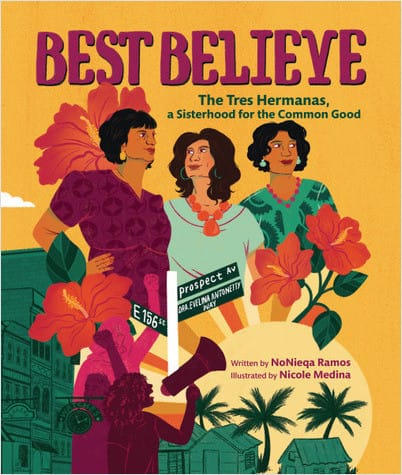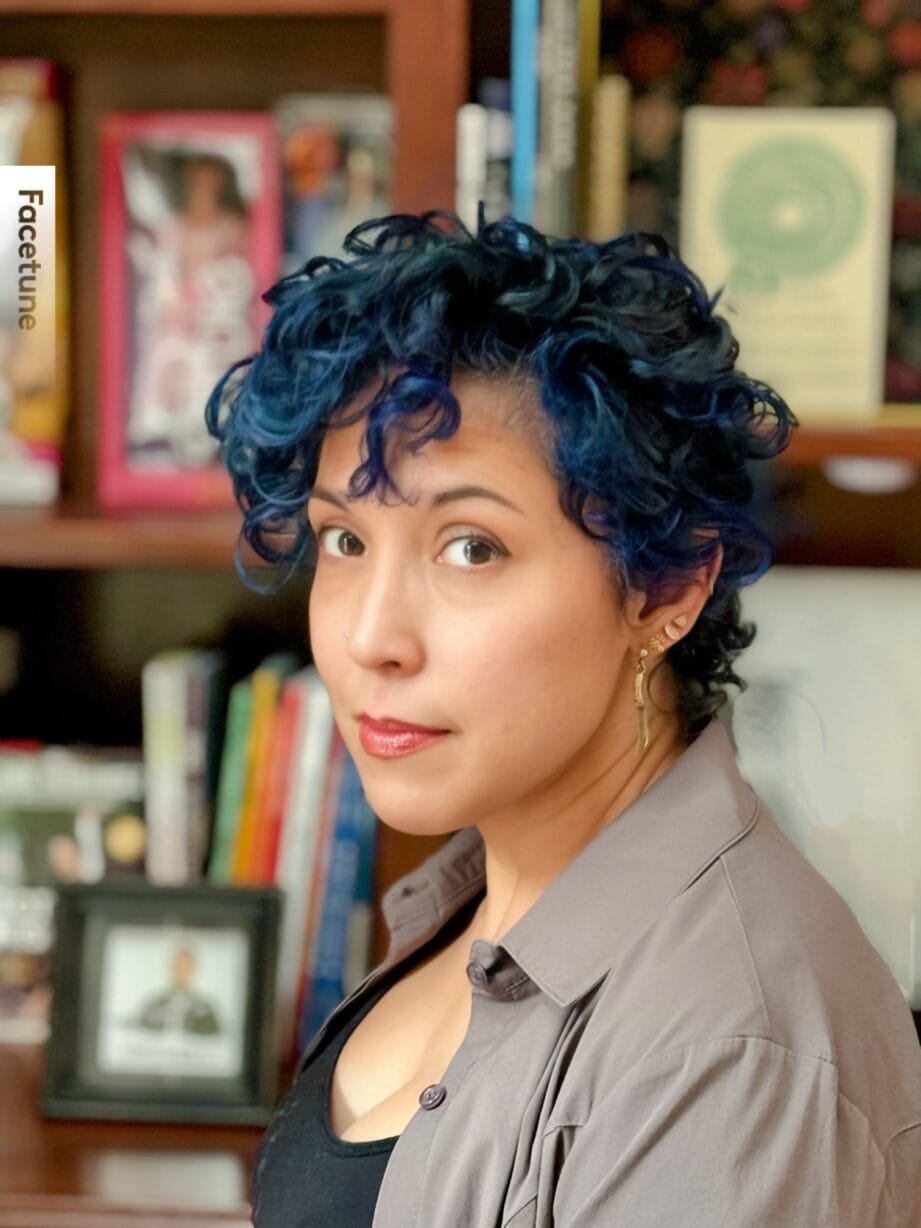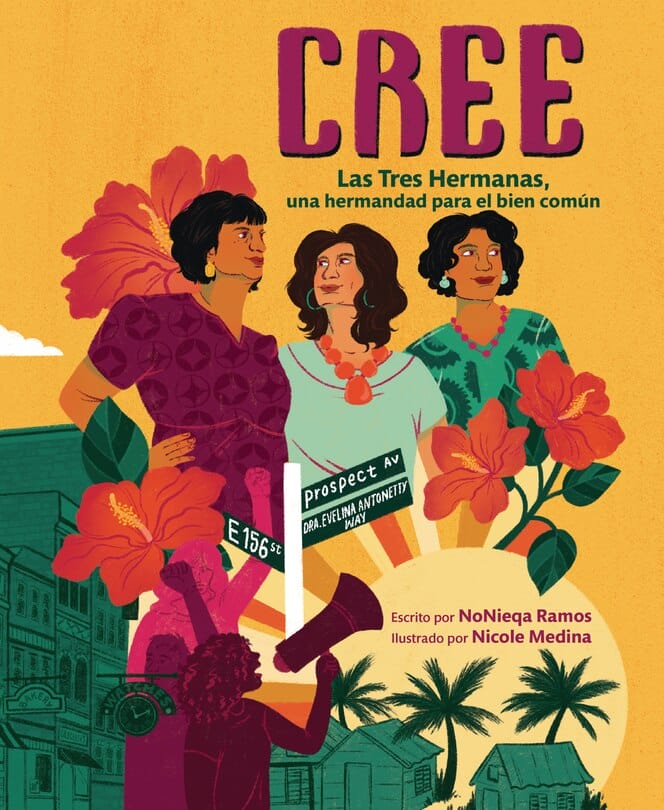By Mary Ann Zehr, contributor
A monthly column in 2025 by a local teacher and reader about connecting with books and taking in Harrisonburg’s literary scene.
~ Ramos, NoNieqa. Illustrated by Nicole Medina. Translated into Spanish by Alberto Rojas. Cree: Las Tres Hermanas, una hermandad para el bien común. Carolrhoda Books, 2025 ~

I don’t want to go back to the days when almost all library books and school curricula in the United States featured white people. When I was a preteen and then teen in the 1970s, it wasn’t easy even to find books for young people with strong and interesting female characters. Fortunately, female authors had written a few. I admired Jo in Little Women, Ramona in Ramona the Pest, Anne Shirley in Anne of Green Gables, and Harriet in Harriet the Spy. These spunky characters taught me that a girl could speak her mind or act boldly, and even if her words or actions were not received well by some people, something good came out of her courage.
Fortunately, by the time I became a high school teacher in 2011, books that featured youth of many different backgrounds and identities had been published. As a middle-aged white woman, I taught English and history to immigrant black and brown teens in D.C. Public Schools. We read and discussed excerpts from The House on Mango Street, by Sandra Cisneros; Enrique’s Journey (in Spanish and English), by Sonia Nazario; My Beloved World, by Sonia Sotomayor; Brown Girl Dreaming, by Jacqueline Woodson; and Students on Strike: Jim Crow, Civil Rights, Brown, and Me, by John A. Stokes (who visited my classes as a guest speaker). I observed that my students were more engaged in my classroom if they saw aspects of themselves in books, authors, and guest speakers. Representation is important.
Someone in the Harrisonburg community who speaks to the importance of representation is author NoNieqa Ramos, who is genderfluid and goes by they/them. Ramos is “a queer Boricua writer from the Bronx who believes diverse books save lives,” the author said in a bio sent to me by email. The bio noted that “they write about people and characters who reflect the world we live in.”
The author and educator has lived in Harrisonburg with their family since 2019, when Ramos’ partner, Michael Richards, became superintendent of Harrisonburg City Public Schools. Ramos wrote in the email that “Michael chose Harrisonburg for its potential to truly fulfill the vision and mission of public education as an institution where any student, regardless of their circumstances, can thrive and reach their full potential.”

Ramos’ most recent children’s picture book, Best Believe: The Tres Hermanas, a Sisterhood for the Common Good (2024), tells how three real-life Puerto Rican sisters worked to improve schools, higher education, and libraries in the Bronx. An example is that Lillian López, one of the sisters, became a Bronx borough administrator who was in charge of libraries. Ramos writes: “Imagine books as magical portals. But back in the 1960s, only English-speaking readers had keys. Lillian fought to introduce Spanish and bilingual books and hire Spanish-speaking staff in Bronx and Manhattan libraries.”
If children or their parents would like to read Best Believe in Spanish, they can now do so. Corolrhoda Books released a Spanish translation of the book, Cree: Las Tres Hermanas, una hermandad para el bien común, on Aug. 5.

Word Play
In Ramos’ children’s books published previously, people or protagonists are bilingual. The author tells stories in English, sprinkled with Spanish words and phrases. In Best Believe, while one of the sisters celebrated her birthday, “the whole barrio” surrounded her “as she blew out the candles over a triple-layer bizcocho.” I looked up an English translation for bizcocho. Ramos could have written cake, but it doesn’t have the same ring to it as bizcocho.
In addition to bilingualism, Ramos highlights extended families and resistance to injustice. Extended family members help the three sisters in Best Believe/Cree and also Ramos’ fictional protagonists to thrive and be joyful. For example, in Ramos’ Beauty Woke (2022), a Puerto Rican girl questions her worth when bombarded with ugly words around her– “illegal,” “cage,” “ban.” Her extended family calls an emergency meeting to instill pride. Beauty’s bisabuela (great-grandmother) takes charge: “¡Escuchen! Listen to me,” she says, “Ain’t nobody gonna school us on beauty.” “Word,” the other 12 members of Beauty’s extended family pictured on the page say in affirmation. Their empowerment of Beauty comes off as resolute and celebratory.
In Hair Story (2021) by Ramos, a grandmother cares for her granddaughter, Preciosa, by combing her flowing curly hair. In Your Mama (2021), Ramos gives only a nod to extended family (“your mama” has “cousins by the dozens”), but resistance to injustice is front and center: “Your mama so woke, she gonna stand by and watch injustice? Nope. She takes all you kids when she votes, with posters homemade, she marches in every parade.” The illustration shows “your mama” walking with three kids and carrying a sign that says lucha.
Queer Characters
Ramos’ children’s books don’t feature any queer characters, but Ramos’ young adult novels do. In the 2024 novel, They Thought They Could Bury Us, Yuiza (she/they) is a queer Puerto Rican from the Bronx. Yuiza is separated from their family when they attend an elite girls’ prep school on scholarship. Puerto Rican pride and extended family are important in this book in the same way they are in Ramos’ picture books. Yuiza channels the personalities and gifts of three loving aunts left behind in the Bronx to address challenges, such as deflecting microaggressions by teachers and peers. Yuiza refers to their aunts as Tía of the Many Husbands, Tía Right and Proper, and Tía Hustler. By channeling the right one, Yuiza tackles a lot of problems.
The novel explores discrimination, trauma caused by institutions, and the impact of mental health issues on families. At the same time, Ramos’ wit and wordplay provide levity. I view Yuiza as a modern rendering of some of the spunky characters I adored and could connect with as a preteen and teen. When peers offer to lend Yuiza clothing to attend a party, Yuiza sets boundaries: “I don’t do dresses. You do you. I do me.”
I remember a couple of my high school students who I think would have connected with Yuiza. Both of these former students are bilingual in Spanish and English and also queer. They had migrated from their countries of origin to the U.S. in part to pursue a life in which they might be accepted. I wish the novel had been published when I was their teacher so that I could have recommended it to them.
While books by NoNieqa Ramos can be bought wherever they are sold, the author encourages readers to purchase them from independent bookstores or online through Bookshop.org. Discounted copies of Your Mama are on sale at Great.full Goods in Harrisonburg’s Agora Marketplace at 165 S. Main Street as long as supplies last. Ramos anticipates publication of 24 Karat Dad in summer 2026 and Stuffies and Cinder Elle in 2027.
Thanks for reading The Citizen, which won the Virginia Press Association’s 2022 News Sweepstakes award as the top online news site in Virginia. We’re independent. We’re local. We pay our contributors, and the money you give goes directly to the reporting. No overhead. No printing costs. Just facts, stories and context. We value your support.












